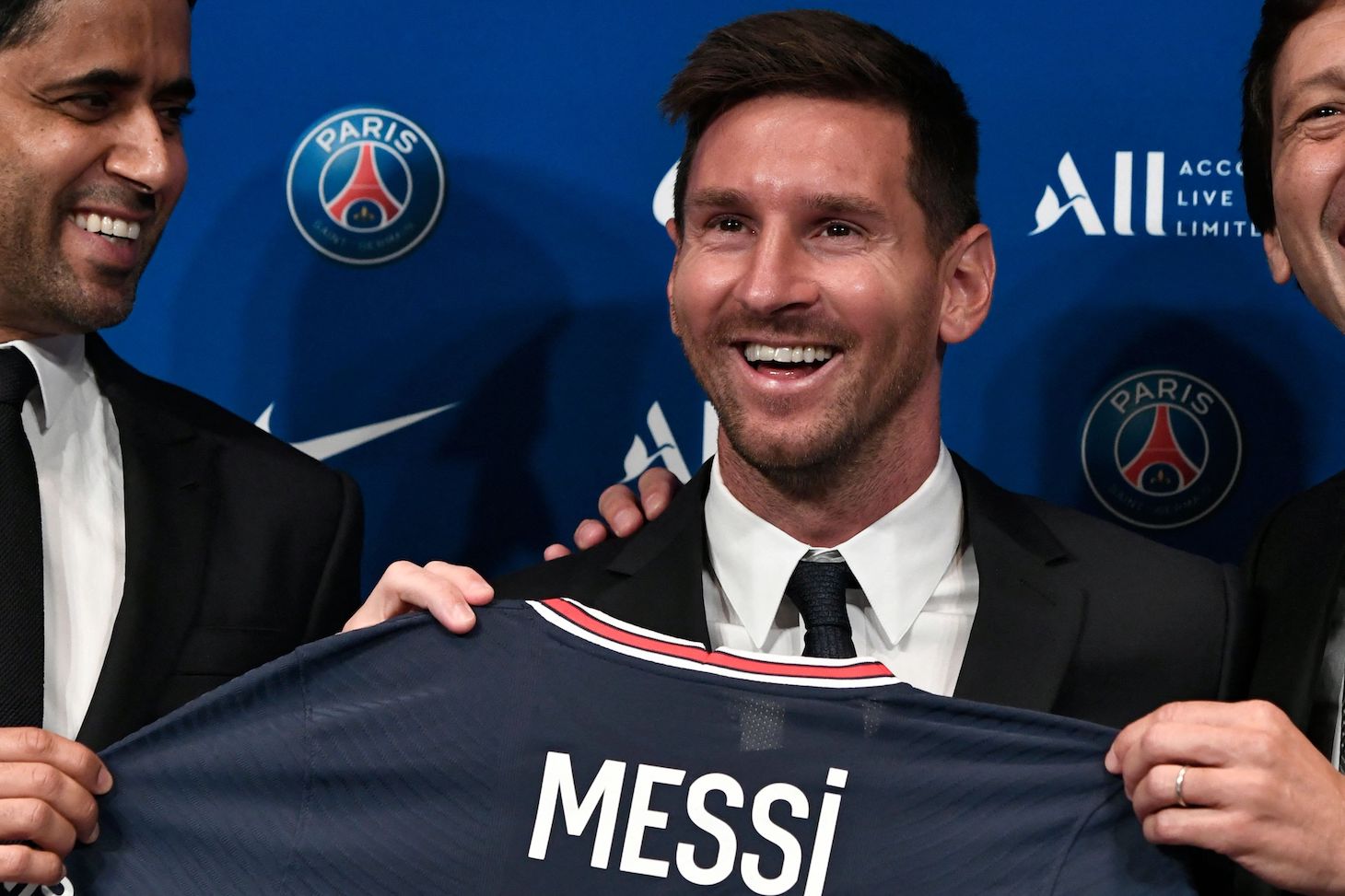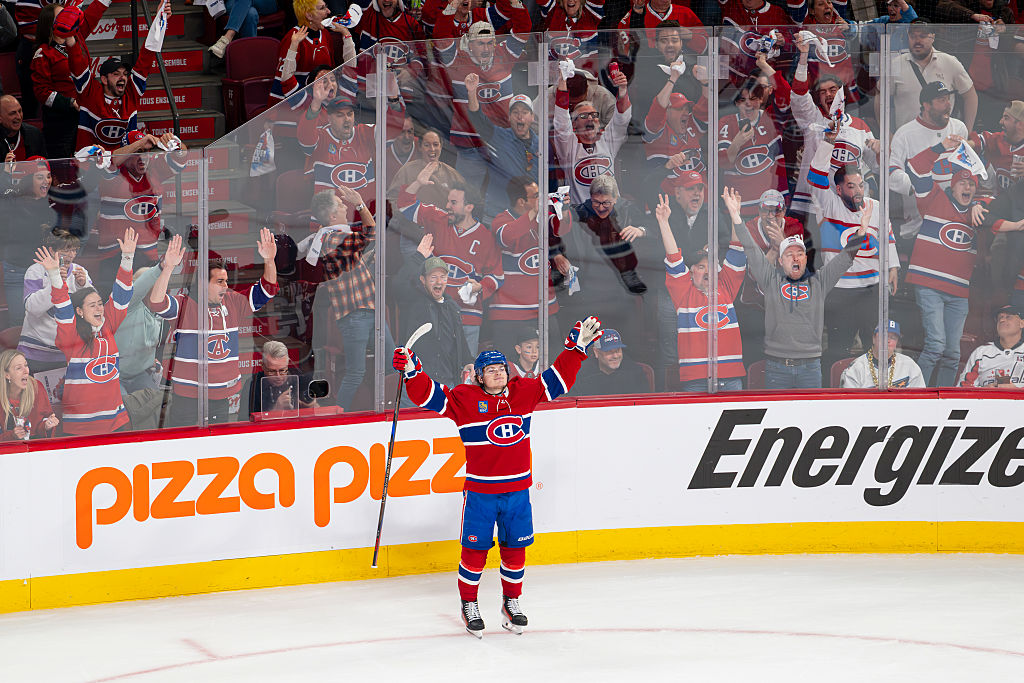For me personally, watching Lionel Messi get forced out of the club of his life and then sign with the evil empire of Paris Saint-Germain, thereby realizing a longstanding dream of reuniting the two best players on the planet but in the wrong shades of red and blue, has stung like a motherfucker. It stings as a fan of Barcelona, and also as someone concerned about the trends in the sport that continue to centralize talent, money, and interest into the hands of the few at the expense of the many. However, as a fan of fun and skill and entertainment and everything else that makes the beautiful game beautiful, I have to admit that I am out of my mind in excitement about how incredible this PSG team is going to be.
I know it's obvious, but really try to let it sink in: Lionel Messi and Neymar are once again on the same team! Do you know how wild this will be? Remember how insane it was a few years ago, when the pair, alongside fellow South American Luis Suárez, were part of the most iconic forward line of a generation, an attack of pure chaos and inspiration and surprise and fluidity and selflessness and joy? As someone who watched nearly every single minute of that Barça, I certainly remember it, and I CANNOT WAIT to see more:
Oh, and you know who's subbing in for Suárez as King Ghidorah's third head? Kylian fucking Mbappé! Currently the game's nearest player to the echelon of otherworldly greatness currently occupied only by Messi and Neymar! He's practically the ideal compliment you'd want for a team possessing a pair of eagle-eyed, pinpoint through-ball passers like Messi and Neymar. Neymar and Mbappé themselves have already proven an unstoppable duo; can you even imagine what it'll look like when you add Messi to this?
And it's not only those three who make the prospect of watching PSG this season so tantalizing. Together with Marquinhos, Sergio Ramos, Marco Verratti, Leandro Paredes, and Ángel Di María, PSG now has a squad featuring a flatly ridiculous level of technical mastery. All those guys' genius for passing, their vision, their propensity to move and combine, and their comfort in tight quarters means we're in for some breathtaking sequences of play, stretching all the way from PSG's own penalty area to the opponent's. I feel sorry for whoever tries to press them high up the pitch this season. It's fitting that the team's manager, Mauricio Pochettino, is Argentine, because PSG has the chance to revive and revitalize the traditional South American toco y me voy style of play, full of one-twos and wall passes and positional freedom and quick, creative touches between bunched-up teammates, a practice that eschews the strict positional structures dominant today in favor of an approach that does justice to the word play.
Nevertheless, there are plenty of legitimate reasons to hate PSG, even when it promises to be one of the most fascinating, attractive teams to follow in years—to hate how its roster has been assembled, to hate what the club represents, to hate how an unlikable club has amassed an arguably unfair amount of talent in an arguably unfair fashion. PSG's rags-to-riches-via-oil-and-blood tale, the way the club tries to use the brilliance of its acquired talents to blind the world to the sordid source of the money that acquired those talents, and how frustratingly well its efforts to buy success and prestige have gone, are all distasteful, and they reveal the seedy interior hidden just a fingernail-scratch beneath the modern game's plasticine surface.
The Messi signing itself reflects some of this ickiness. The simplest story of Messi's departure from Barcelona is that Barça had been living at the far edge of its means for years, and while it could mostly get away with that in normal times, the economic shock of the COVID-19 pandemic brought it all crashing down. But underneath that story is another, broader and more insidious one about the struggle over the sport's financial future.
On one side you have the incursion of vampiric private equity into yet another industry, in the form of La Liga's proposed deal with CVC Capital Partners. That deal seeks to sell 10 percent of the league's future business rights over the next 50 years in exchange for an upfront payment of about €3 billion. The agreement might mortgage Barça's and Spanish soccer's future in exchange for a relatively small payday today, but it could also rescue both of them from their present economic misery.
On the other side you have the monopolistic cabal that is the Super League, which Spanish paper La Vanguardia speculates is the true motivation for Barça president Joan Laporta's about-face in regards to the CVC deal. The thinking there is that Laporta, who reportedly was in favor of the agreement initially when he believed it could expand Barça's salary cap by enough to squeeze in a new Messi contract, realized the CVC deal might preclude Barça from joining a future Super League. In light of that, he decided to forego Messi's final years to instead keep Barça in the (hopefully doomed) search for El Dorado.
With Messi eventually leaving, both Barcelona and La Liga—and by proxy both the Super League and the private equity vampires—failed to advance their interests. Ultimately, the big winner was a third ghoul of the modern game: the state-sponsored, sportswashing club, here represented by PSG. If you're looking for a good guy to root for here, you won't find one.
So yes, money is ruining our beloved sport, PSG is bad, Qatar is evil, and it sucks that Messi now calls Paris, not Barcelona, home. If your main takeaway from this historic signing is to decry all of that, I'd understand. But while certain doomsday commentators would have you believe that all is lost, and that PSG and Manchester City and Chelsea and the other oft-decried nouveau riche clubs are accelerating soccer toward some existential calamity of never-before-seen proportions, I believe some perspective is in order.
None of this is really new. The belief that "money in the game" is on the cusp of corrupting soccer's noble essence is at least as old as the professionalization of the English game back in the 1880s, which put an end to the ballyhooed ideal of amateurism, itself little more than a sophism meant to protect the game's leisure class athletes from competition with those who'd kick their asses on the pitch every day if they didn't have to work for their living. Staying in England, home to a disproportionate number of the "money in the game" hand-wringers, you can see in the history of the derisive term "Bank of England club" that many of the same things being said about PSG today were once said about some of PSG's purported "victims" some 100 years back. That term was first coined for and hurled at the dominant Arsenal teams of the 1920s and '30s, whose chairman and majority owner, Henry Norris, had injected loads of cash into the club to fund a new stadium, bring in a horde of expensive stars, and maybe possibly bribe and/or blackmail the club's way into a controversial promotion into the First Division.
"But the money itself isn't the problem," these purists might whine, gripping and twisting their fingers tighter and tighter. "It's that these new clubs are owned by state entities! For ulterior motives!" True, I don't know of any precedent in olden times for whole sovereign nations, or at least their subsidiaries, owning clubs. But governments putting their thumbs on the scale to help a favored team has always been around. Let's take Real Madrid's famous Galáctico policy, which, as a sustained raid on major rivals' rosters for their best players, far surpasses anything PSG or Man City have been able to do. When Florentino Pérez took over as club president in 2000, Real Madrid was buried under a pile of debt. But Pérez, a construction magnate, had a plan. He used his considerable government connections to get the city to rezone the land upon which the club's training facilities sat. This rezoning from public- to commercial-use made the land much more valuable, which allowed Madrid to sell the grounds for an enormous, debt-erasing, transfer kitty–stuffing sum. Is that not state influence, albeit of a subtler and less direct variety? And for an example of ulterior motives, let's just say you'd have to be pretty naïve to believe that the only reason Silvio Berlusconi has poured so much money into AC Milan is due to his unadulterated love of the game.
"But what about Qatar? They use literal slave labor, man! You just expect me to be OK with that?" I too have been horrified by the human rights abuses I've learned about in some of these Gulf nations, and I'll concede that they pose moral concerns a lot more serious than those raised by, say, how the Manchester United–owning Glazer family got so rich. However, I do find it a little off-putting the flattened, Manichaean way some people talk about Qatar by way of PSG.
In terms of its modern economic and geopolitical history, the entire Gulf region of the Middle East was designed consciously and almost entirely by Western governments and corporations—predominantly British and American ones—as a means to enrich the West and strengthen its hold on global power. So many of the companies at the heart of these micro-states' economies—which unceasingly pump oil and cash into the bank accounts of the region's ruling class, some of which is then siphoned off to fund PSG's and Man City's transfer dealings and salary payments and embellished sponsorships—began life as Western companies that were eventually nationalized when the locals got tired of the Westerners treating them badly and keeping most of the profits for themselves.
This isn't to say that Westerners aren't allowed to criticize Qatar or Abu Dhabi, nor to absolve the morally bankrupt regimes of their sins. But like Americans slamming Latin American countries as dysfunctional when that dysfunction is often a direct result of ruinous American intervention, I do think it's worth keeping in mind how and why certain parts of the world look the way they do before ladling out the sanctimony.
And anyway, my point here isn't that PSG is actually a force for good or that Qatar gets a bad rap or anything like that. Rather, my point is that the sport has been dealing with corruptive influences both real and imagined for ages, and yet the game endures. The artistic, competitive, and communal aspects of soccer are stronger than the oppositional influences that seek to limit or distort or co-opt them. No matter how much ill-gotten money Qatar spends to build a great PSG team, the players, the things those players do on the pitch, and the feelings those dribbles and passes and goals elicit in those who watch, will never belong to them. There is power in the game, but it is ours, not theirs. It is a transcendent power that belongs to no one exclusively and to everyone collectively—something illustrated most emphatically by the collective's killing of the Super League.
If you believe in the transcendent power of art and sport, then you should believe that the wondrous creations PSG's players and coaches will soon invent can transcend their associations with PSG and Qatar and the rest. You're free to ignore this and to foreswear PSG matches if you'd like, of course. But you'd be doing a disservice to yourself and to the possibilities of what the game can mean and do. In my opinion, you'd be better off trying to enjoy the good. There will be a lot of it, and it all can be yours, if you want to take it.






